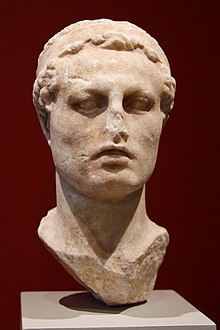
Back Antiochus IV Afrikaans አንጥያኮስ አፊፋኖስ Amharic أنطيوخوس الرابع Arabic انطيوخوس الرابع ARZ دؤردونجو آنتیوخوس AZB Антиох IV Епифан Bulgarian Antíoc IV Catalan Antiochos IV. Epifanés Czech Antiochos 4. af Seleukideriget Danish Antiochos IV. German
| Antiochus IV Epiphanes | |
|---|---|
 Bust of Antiochus IV at the Altes Museum in Berlin. | |
| Basileus of the Seleucid Empire | |
| Reign | 3 September 175 – November/December 164 BC |
| Predecessor | Antiochus, son of Seleucus IV |
| Successor | Antiochus V Eupator |
| Born | c. 215 BC |
| Died | November/December 164 BC (aged 50–51) |
| Wife | |
| Issue |
|
| Dynasty | Seleucid |
| Father | Antiochus III the Great |
| Mother | Laodice III |
| Religion | Greek polytheism |
Antiochus IV Epiphanes[note 1] (c. 215 BC–November/December 164 BC)[1] was king of the Seleucid Empire from 175 BC until his death in 164 BC. Notable events during Antiochus' reign include his near-conquest of Ptolemaic Egypt, his persecution of the Jews of Judea and Samaria, and the rebellion of the Jewish Maccabees.
The son of King Antiochus III the Great, Antiochus IV accession to the throne was controversial, as he was seen as a usurper by some. After the death of his brother Seleucus IV Philopator in 175 BC, the "true" heir should have been Seleucus's son Demetrius I. However, Demetrius I was very young and a hostage in Rome at the time, and Antiochus seized the opportunity to declare himself king instead, successfully rallying enough of the Greek ruling class in Antioch to support his claim. This helped set a destabilizing trend in the Seleucid Empire in subsequent generations, as an increasing number of claimants tried to usurp the throne. After his own death, power struggles between competing lines of the ruling dynasty heavily contributed to the collapse of the empire. Antiochus's often eccentric behavior and capricious actions led some of his contemporaries to call him Epimanes ("The Mad").
Cite error: There are <ref group=note> tags on this page, but the references will not show without a {{reflist|group=note}} template (see the help page).
- ^ "Antiochus IV Epiphanes". Livius.org.